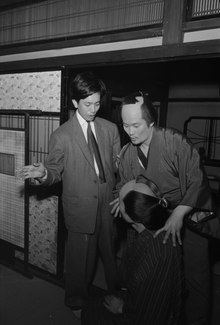Sun in the Last Days of the Shogunate
| Sun in the Last Days of the Shogunate | |
|---|---|
| Directed by | Yūzō Kawashima |
| Written by |
|
| Produced by | Takeshi Yamamoto |
| Starring | |
| Cinematography | Kurataro Takamura |
| Edited by | Tadashi Nakamura |
| Music by | Toshiro Mayuzumi |
Production company | |
| Distributed by | Nikkatsu |
Release date | |
Running time | 110 minutes |
| Country | Japan |
| Language | Japanese |

Sun in the Last Days of the Shogunate (幕末太陽傳 or 幕末太陽伝, Bakumatsu taiyōden) is a 1957 Japanese
Plot
During the last days of the Bakumatsu era, rogue city dweller Saheiji and three friends visit a brothel in Tokyo's Shinagawa entertainment district. After spending the night there, Saheiji is forced to admit that he lacks the money to pay, so he must stay in order to settle his debt. Saheiji seeks to outwit the inhabitants of a brothel in order to survive. Meanwhile, a group of samurai seek to destroy any foreigners that cross their path. Saheiji attracts all employees, from brothel owners to prostitutes, successfully resolves any disputes with clients by using his wit, and fills his pockets. However, gradually it turns out that the seemingly life-loving Saheiji suffers from tuberculosis and his future is uncertain.
Cast
- Frankie Sakai as Saheiji
- Yōko Minamida as Koharu
- Sachiko Hidari as Osome
- Yujiro Ishihara as Takasugi Shinsaku
- Nobuo Kaneko as Denbei, the owner of the Sagami-ya
- Masumi Okada as Kisuke
- Tomio Aoki as Chusuke
- Shōichi Ozawaas Kinzō, the book lender
- Shōbun Inoue as Genta
- Toshio Takahara as Kaneji
- Izumi Ashikawa as Ohisa
- Akira Nishimuraas Shinkō
- Taiji Tonoyama as Kurazō
- Hideaki Nitani as Shidō Monta (a.k.a. Inoue Kaoru)
- Akira Kobayashi as Kusaka Genzui
Theme
Parallels are drawn between the world of the samurai and the world of Kawashima's Japan. The hypocrisy surrounding prostitution, about to be outlawed in Japan at that time in 1950s Japan, the abuse of power, and financial greed at a time of crisis, are all portrayed.[5]
Legacy
Japanese filmmaker Akira Kurosawa cited Sun in the Last Days of the Shogunate as one of his 100 favorite films.[6]
References
- ^ a b "Bakumatsu taiyōden". Japanese Movie Database (in Japanese). Retrieved 16 January 2009.
- ^ a b "Bakumatsu taiyōden". Kinenote (in Japanese). Retrieved 4 June 2023.
- ^ "Bakumatsu taiyōden". Kotobank (in Japanese). Retrieved 11 October 2021.
- ^ "Kinema Junpo: Japanese one hundred all time best movies" (in Japanese). My Cinema Theater. Retrieved 10 September 2011.
- ^ Moviemail catalogue, April 2013, p.13
- ^ Thomas-Mason, Lee (12 January 2021). "From Stanley Kubrick to Martin Scorsese: Akira Kurosawa once named his top 100 favourite films of all time". Far Out Magazine. Retrieved 23 January 2023.
External links
